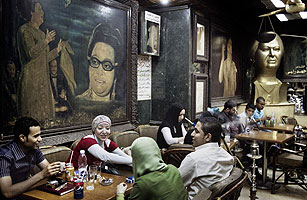
The Times They Are A-Changin' The young Egyptians gathered in this Cairo café are the kind of voters the Islamists covet
(2 of 3)
Organization, by contrast, has always been the Muslim Brotherhood's strong suit. Founded in 1928 to promote Islamic law and values, it has endured brutal suppression by a succession of Egyptian leaders. Estimates of its membership vary from 100,000 to many times that number. In the Mubarak years, open association with the Brotherhood was an invitation to police harassment or worse. The group has long been feared in the West as the source and exporter of radical Islamist ideology: violent groups like Hamas are direct offshoots of the Brotherhood. Some scholars trace the origins of terrorist groups like al-Qaeda to the Islamists. In Egypt, however, the group long ago rejected the rhetoric of violent jihad, and it is seen as a social movement as much as a political entity. Egypt's poor have long associated the Brotherhood with its social services, like free clinics and schools.
Now the Brotherhood needs to broaden its base to include middle-class and affluent Egyptians. Many of the young men and women hanging out on the October 6 Bridge on a Thursday evening — enjoying a cool breeze off the Nile and the chance for some mild flirting — seem comfortable with the idea of an Islamist-led government. "We know these guys. We go to school with them, eat with them, play soccer with them," says Fadel, a 20-year-old university student. "If they come to power, we'll judge them by their results, not the size of their beards."
Under the circumstances, you might expect the Islamists to be reveling in their ascendancy, seeing it as an endorsement of their extreme views. They're doing no such thing. Instead they are herding toward the political center, adopting positions that would be entirely familiar in Western democracies. Leaders of Egypt's Muslim Brotherhood and Tunisia's Ennahda (Renaissance) talk about economic priorities: creating jobs, reducing debt, attracting foreign investment, halting the exodus of skilled labor. There's little talk of Shari'a or of restricting the rights of women or non-Muslim minorities.
To reassure critics who fear that the Islamists will seek to remake Egypt as a theocratic state, the Brotherhood is entering the ring with one hand tied voluntarily behind its back: its new political arm, the Freedom and Justice Party, will contest only half the seats in the first post-Mubarak general elections, expected in the late fall, and will not field a candidate for the presidential election in early 2012. (When a Brotherhood stalwart, Abdel Moneim Abou el-Fatouh, declared his candidacy in May, he was expelled.) This guarantees that the party will not have anything like a majority in the new parliament, which will take on the highly sensitive task of rewriting the constitution. All parties, says el-Erian, will have a say in framing new laws. Why is the Brotherhood giving up a shot at political dominance? El-Erian says it's because "we recognize that it would create fear, and the absence of fear is good for us as much as it is good for Egypt."
The liberals I meet aren't buying this. Some tell me it's an empty gesture: the Brotherhood knows it can't win a majority anyway. Alaa al Aswany, Cairo's most famous living novelist and a prominent liberal, claims that the Brotherhood doesn't have broad support, pointing to recent wins by liberal candidates in bellwether student-union elections at several universities. But he is nonetheless apprehensive. For all its vaunted political principles, al Aswany says, "in the Brotherhood, anything is allowed [in the pursuit of] power, so we can never trust them." Others smell a ruse: the Brotherhood will simply have proxies contest the rest of the seats as independents and will try to win a majority, allowing it to drown out liberal voices in parliament.
It doesn't help that liberal groups are in disarray. The kids who brought down dictators in Egypt and Tunisia have shown little interest in forming political parties. Wael Ghonim, the young Google executive who became the most recognized face of the Tahrir Square revolution, has dropped out of sight. Older liberal pols, who lack the revolutionary credentials of the youth and the organizational skill of the Islamists, are struggling to keep up. Mohamed ElBaradei, the former U.N. nuclear watchdog and Nobel Peace laureate, can't seem to make up his mind whether to run for President.
The liberals are also showing themselves to be poor democrats. Several prominent liberals — ElBaradei among them — have launched a signature campaign to force postponement of the parliamentary elections and get an unelected panel of experts to first remake the constitution. The Constitution First campaign, a Western diplomat in Cairo tells me, "reflects the liberals' uncertainty about how they will do in elections and a desire to lock in some protections." Politically, too, the liberals' call for postponement is nakedly self-serving: it would give them time to try and match the Brotherhood's grass-roots organization.
Can the liberals and the Islamists learn to play fairly with each other? The question is being asked not just in Cairo and Tunis but also in Damascus and Sana'a: if religious and secular groups can work together in Egypt and Tunisia, that would send a powerful message to Syria, Yemen and other Arab countries where revolutionary winds are blowing. Western governments, too, have a stake in the answer. Since the fall of Mubarak, much of the discussion in the U.S. and Europe has been about whether his successors can come to terms with the West and maintain peace with Israel. But the first and most important test of the new Arab democracy may be whether its conflicting political tendencies can accommodate each other.